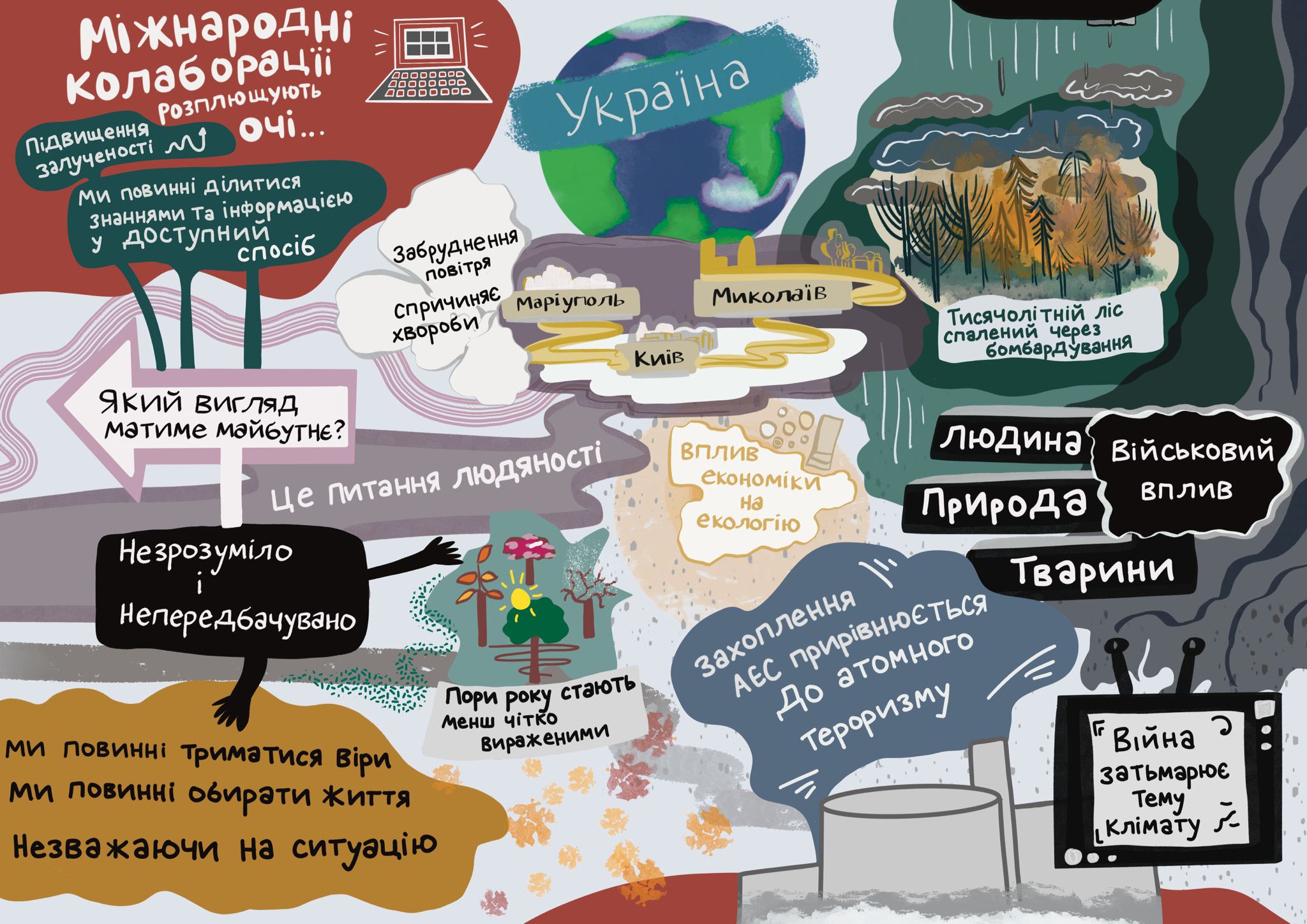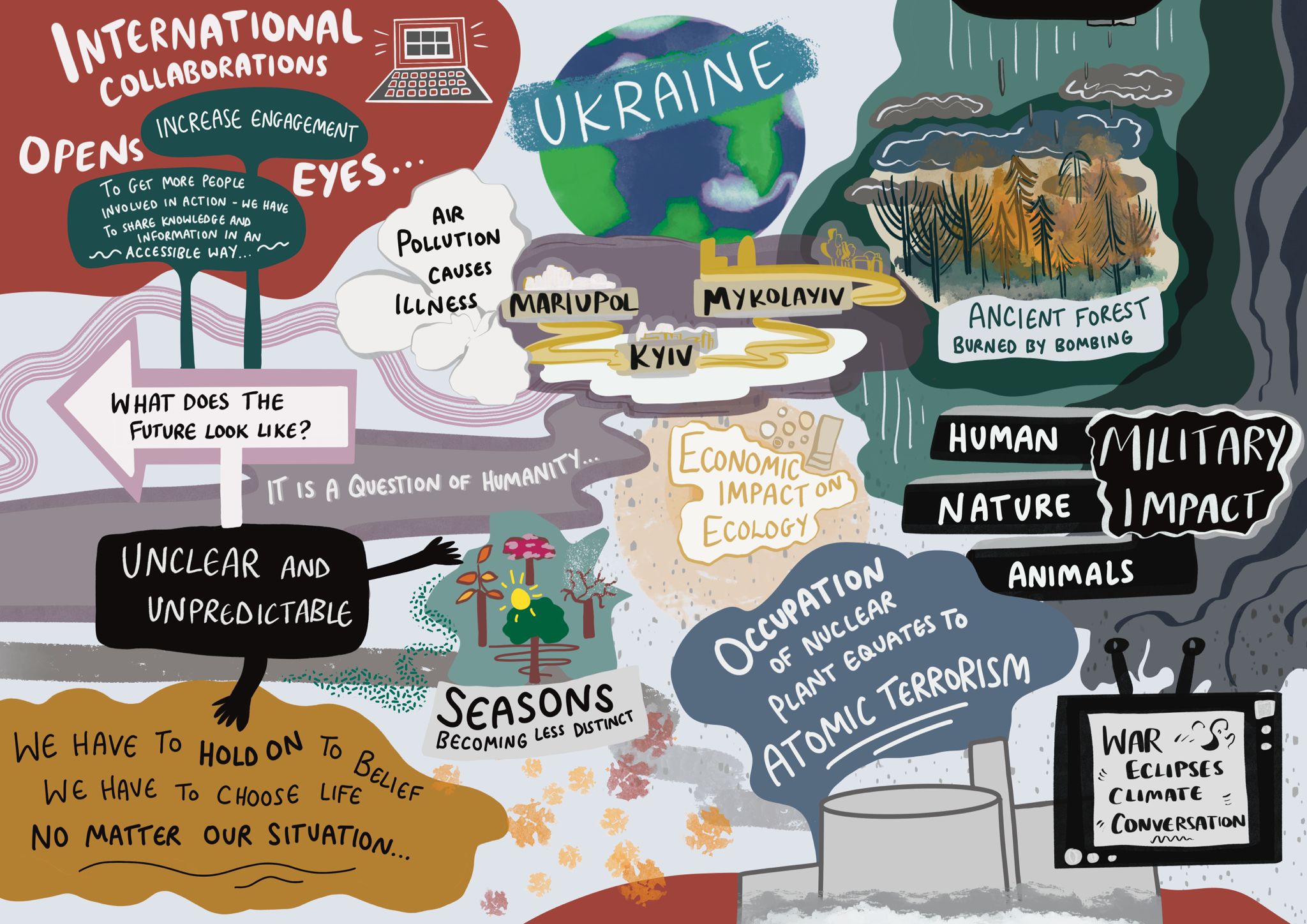Привіт, мене звати Андрій Палатний. Я вживаю до себе займенник "він", я високий, у мене є борода і довге волосся. Я живу в умовах кліматичної надзвичайної ситуації протягом 36 років.
Hi, my name is Andrii Palatnyi. Usually I use he. I am tall, have a beard, a long hair. I have lived through the climate emergency for 36 years.
Today, the second of September 2022. Time is 5pm 12. I was born in Ukraine, in the city Mykolaiv in the south of Ukraine. Chernobyl was happened and everyone tried to move from the capital and the central part of Ukraine and mother was pregnant. And she came to Mykolaiv and I was born in hospital there.
This is a river city, approximately two and a half hundred years old, not big but not small. There's some industries more focused on ship building and ship repairment and some agriculture. And after two years old, I came to Kyiv, to capital of Ukraine, where most parts of the life I have spent. Kyiv is a big, metropolitan city with a lot of citizens, transports, buildings, also industries. And due to my activity - I also work as art curator in different districts of Ukraine - especially with district, let's say, who are close to conflict area, or has a strong industrial background.
I feel a climate emergency in Ukraine in several dimensions, one dimensions, it's something that may be similar to other countries in the region, its usual human being activity, especially industrial activity. I have a strong experience to work and even to live some period in Mariupol, where I remember when I became ill. What means to be ill in the region where you really has dirty air. It's a special experience.
Another dimensions, it's what we have now, due to current events in Ukraine. It's a full scale invasion of Russia. And it's a lot of military activities that live in the nature in the city as a result. Which are a danger for human, but also danger for nature. In Mykolaiv there are some really amazing natural places, there are even some old forest from ancient time, a lot of very unique animals. I need to say now that Mykolaiv also all the time bombed, really bombed and it's already destroyed several big factories, a lot of victims. So I physically not present in it. But of course, I feel it as my native city and also could understand people who still make solution to stay there even if it's a risk for their lives and for the lives of their family. This feeling to be connected with ground. It was the reason why my first decision was also to stay in the country. In Kyiv if you feel this connection very very concrete and very strong when enemy came to your home to your house.

At the same time now we have a new dimension. It's atomic question, this situation with Chernobyl, militaries, when came there. But Chernobyl is closed. Another story is the biggest atomic station in Europe, Zaporizhzhia Nuclear Power Plant which now still under control of Russian troops. Of course, from our perspective, we could say it's state terrorism, in this case, atomic terrorism, nuclear terrorism. It's something that for sure we can't predict but it's on table and it's connected not only with Ukraine but all over the world. Another force dimension maybe not so big, but also for me important. It's a lot of people who - as refugees - who leave the country and leave their flats, their animals, their plants. A lot of animals died, died through military wars or just because they were close in the flats. It's a big volunteer movement now in Ukraine, which tried to help to keep animals. Several months without civil transport, without car or bicycle, I moved through the city to keep all of them. Trying to find food, special foods, in the circumstances where everything closed.
Honestly, I don't remember when I first time heard about climate crisis. For sure it wasn't so resonance for me. And maybe more serious my attention take when, in the professional life when I become a theatrical writer and start collaborate with different colleagues from all over the world, I went more deeply in it and understand a real importance of it, especially last year's, a winter and summer, spring and autumn. In childhood, you had really strong differences between four seasons. Now, it's very flexible. You of course, you could have different level of coldness and hotness, but this changing between one season to another could be very short. You even could miss and my last year were a little springtime, or weather very little autumn time. I don't know how it's in other countries. But in Ukraine we also has, let's say old calendar and contemporary calendar. It's connected with a religion, also with Christmas, Easter. And old calendars are much more connected with a real changes than contemporary calendar. It also show how people who live earlier how they were connected with nature and what for them were a signal of changing how ground look how rain fall, when flower show, sky, etc. So this is something that I feel that I missed, for example, in education.
In community in which I stay, the climate changes it's important topic. Maybe not on the first, especially now because of course war topic is something that influence on everywhere. I have a feeling that it's bubbles. And if you saw on it from bigger perspective, it still may be most parts of the society can't identify what to do with it. From thinking to doing it's also a big question how to organise this technology and how to be accessible and is understandable for people what they could do.

How I feel about the future is the most complicated question that always was. But nowadays, it's also very concrete and unclear at the same time. From one side I'm afraid about future because general situation of the country, cities in which I work and people who might know. It's a big humanitarian catastrophe what we have: family split it, territory occupied, victims and military action systematical. Each day you have last six months, especially in the use of dying people and these dying people become a numbers. And then it just numbers. And how to keep humanity in this. It's a big question.
At the same time absolutely and clear futur even if you continue staying and fighting. How geopolitics things influence how military front, informational, front, cultural front and other dimensions of this complex situation will be. Economy, of course. So from one side, I have fear about what future will be for families, for economy in general. But at the same time, I keep belief and I try to keep it strength to stay and to do in a different way, what possible, inside and outside of the country. And I say it, let's say in a short perspective, but also in a long perspective, because the impact that we have now with human beings in general, from war, from state terrorism, from military actions, and at the same time, the systematical influence of global economy, on ecology of whole world, global impacts need global answers, and it's can't be that someone alone will find answer only, it's impossible. And I have a strong feeling that now all humanity again, on this big crossroad. And which direction will be chosen? Is it enough people with the heart and open minds in the world to choose a right direction? It's always question, what is right, what is wrong? But direction connected with life, let's say of his life, not with deconstruction? And because it's also the question in which world will live our children and the next generation. And on this perspective, it's something that all of us need to take responsibility nowadays even now and here. It doesn't matter where we stay in which circumstances. To be active and acting in climate emergency important for me, because imagine the world in 100 year, is it enough food? Is it enough water? Is it enough fresh air? Is it enough nature? I can't easily answer on this question. And this situation I think describe the most. This question for sure should be easily, but it is not.
What makes me feel hopeful for future. I think it's belief.
Що дає мені надію на майбутнє? Я вважаю, що це віра.